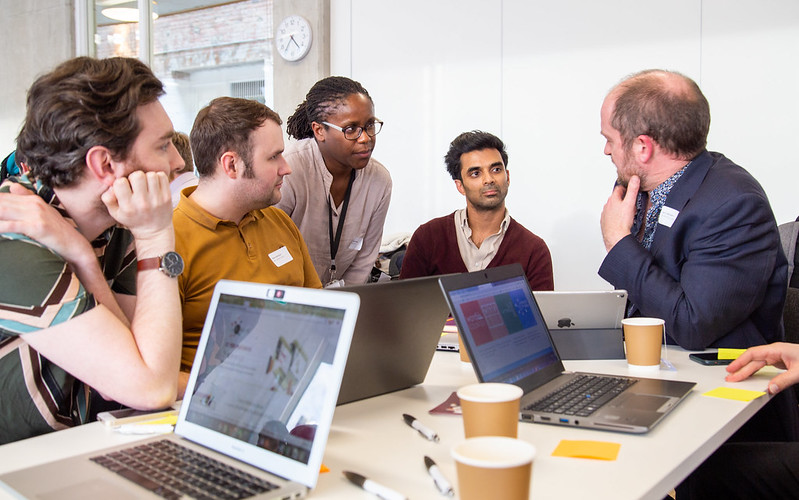How to build a data culture
To make the best use and impacts from data, organisations often need a culture shift. We talk a lot about the benefits of developing a data culture, but what does that mean? Here, Rachel Rank sets out the characteristics and how grantmakers can embed them in their own organisations.

A group discussion at the launch of 360Insights, a tool to combine and visualise open grantmaking data (shared in the 360Giving Data Standard) and other data to understand funders better.
When we launched 360Giving’s first strategy back in 2016, we set out a vision for grants data to be used for decision making and learning. At the heart of this vision is better sharing and use of funding data, to give us a fuller picture and enable more strategic grantmaking across the UK.
However, in hindsight, we didn’t talk enough about the culture shift that organisations need to make for this to happen. Opening up data isn’t enough if people don’t know how they can use it meaningfully, or struggle to make it relevant to their organisation’s wider work.
Our vision is for grantmakers to use data to support everything they do, from checking the performance of their financial investments to learning about changing needs and what kind of organisations they’re funding. All this data helps them to better understand themselves and the ecosystem they exist within.
But if grantmaking organisations don’t have a culture of using and sharing data, then we won’t achieve our vision, no matter how much good data is being shared.
What is a data culture?
When we talk about a ‘data culture’, we don’t just mean one thing. We mean having a combination of things – almost like values or principles – that organisations naturally do as part of their day-to-day. Like a starter dough for bread, or a live culture for yoghurt, having a data culture enables organisations to do great things with data.
Your organisation has a data culture if:
- You conduct regular data audits, reviewing what data your organisation currently collects and how it’s stored safely.
- You know how data is used in your organisation, by who and what for.
- You know how data is shared, by who and what for.
- You have these written down somewhere in a document that is regularly maintained and reviewed, e.g. in a data strategy.
- Everybody knows about this data strategy in the organisation, from trustees and directors to managers and database users. It should be relevant to them and their work.
- You help non-experts to access the data, so it’s not only provided in a database and spreadsheets, but in other visual formats too, depending on the skills and needs of your staff.
- You talk about data internally – at all levels of the organisation.
- You also talk about data externally – both your own data and wider data issues.
- You use your data to understand yourself better as an organisation – using visualisations and analysis to hold up a mirror – then act accordingly.
- You repeat points 1 to 9 regularly, improving and tweaking your approach as your organisation learns more about itself. Ultimately, a data culture is a learning culture.
How can 360Giving help with building a data culture?
If you would like to build a data culture in your grantmaking organisation, there are four ways we can support you:
- We can help you review what data you currently collect about your grantmaking and how that supports your wider work. Understanding what data you collect and why is the first step towards developing a data strategy.
- We can help you understand and use the data that is being shared in the 360Giving Standard and showcase tools that make it easier to interact with data.
- We provide opportunities to share ideas and examples of building a data culture through our regular workshops and events. This helps you to learn from your peers.
- We can help you to better understand what your grantmaking data says about you, and how to make that more accessible to different users.
To find out more about our upcoming workshops and networking events, sign up for our newsletter and follow us on Twitter.
If your organisation is already sharing data in the 360Giving Data Standard, you can book an office hour with us to explore options and ideas for next steps to help you embed data use in your organisation.
With thanks to Dirk Slater, coordinator of the Data Champions programme, for his input into this article.
